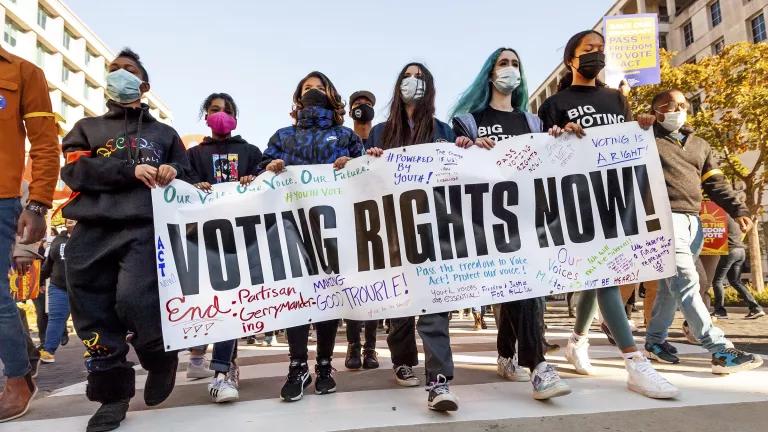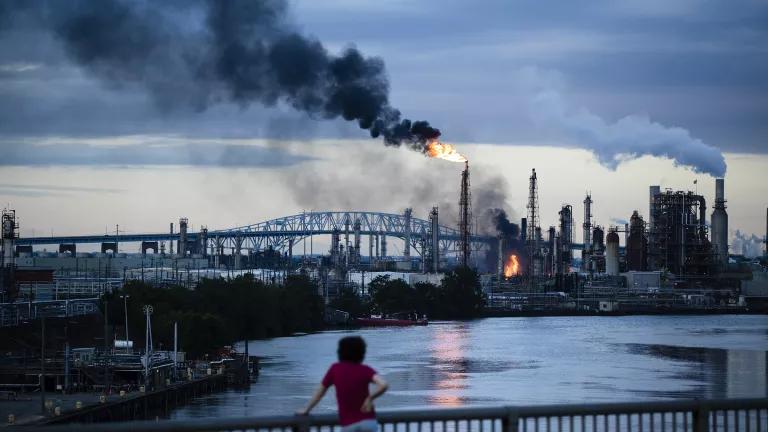Pollution Is Not an Equal Opportunity Killer. Nor Is COVID-19.

The Trump administration’s assault on clean air strikes directly at the public’s ability to survive the coronavirus pandemic.
Breathing dirty air makes people more likely to die from COVID-19, a nationwide study has found.
This isn’t politics. It’s science.
Air pollution aggravates problems like lung disease and heart troubles, which can weaken a patient’s ability to survive COVID-19. As a result, death rates from COVID-19 are 15 percent higher for people who live in areas with even slightly more air pollution than places with cleaner air, according to the study from the Harvard T. H. Chan School of Public Health, where I serve as a professor of public health.
The key culprit is microscopic particles called particulate matter that get pumped into the air from burning fossil fuels like coal, oil, and natural gas.
The study confirms what we have long known: pollution kills. But it is not an equal opportunity killer. It harms the most vulnerable—people of color and low-income communities that are more often impacted by highways, power plants, refineries, and other sources of pollution. As my former colleague Mustafa Ali put it, communities of color “have always been the sacrifice zones.”
The Harvard study connects the dots between these impacts and COVID-19. It shows that, amid the global pandemic we’re struggling to contain, we have an ongoing health crisis caused by pollution that’s making the coronavirus more deadly for some people.
The Harvard researchers looked at data from more than 3,000 counties across the country—covering 98 percent of the U.S. population. They examined local, long-term air quality and COVID-19 death rates up to April 4, 2020. They accounted for factors like population density, number of hospital beds, and health-related variables like obesity and smoking status.
Separately, we’ve learned that, because some communities are bearing an unjust burden of dirty air, they’re also suffering a disproportionate amount of the pre-existing conditions that reduce their ability to survive this virus. This pandemic is making it clear, once again, that tackling the social and environmental disparities in our communities is essential to improving public health.
Emerging data from states like North Carolina, Michigan, Illinois, and Louisiana, and big cities like Chicago and Los Angeles, show that African-Americans are dying from the coronavirus at disproportionately higher rates than other groups.

In Chicago, where African-Americans make up just 30 percent of the population, they’ve accounted for more than half of the patients who’ve tested positive for COVID-19 and 72 percent of virus-related deaths. “Those numbers take your breath away,” said Chicago mayor Lori Lightfoot. “It’s unacceptable. No one should think that this is okay.”
Across Illinois, African-Americans make up 15 percent of the population but 43 percent of the COVID-19 fatalities. In Michigan, 14 percent of the population is African-American, but that group has made up 40 percent of the state’s coronavirus deaths. About one-third of Louisiana is African-American, but 70 percent of those who’ve died from COVID-19 are Black.
These disparities are linked to deeply embedded inequality in health conditions and access to health care. The bottom line is that dirty air is making this pandemic more deadly for many of our people.
“The majority of the pre-existing conditions that increase the risk of death for COVID-19 are the same diseases that are affected by long-term exposure to air pollution,” the study concludes. “The study results underscore the importance of continuing to enforce existing air pollution regulations to protect human health both during and after the COVID-19 crisis.”
Unfortunately, the Trump administration has been taking us in exactly the wrong direction on environmental and health protections in too many ways to count, but I want to focus on three significant actions taken by the U.S. Environmental Protection Agency just since this pandemic has hit.
- The administration is working to prevent scientific research like the Harvard study from guiding federal agencies in developing common sense safeguards that protect us from exactly this kind of pollution. Long a goal of the polluting industry, the move would sharply restrict the way the EPA uses medical data and other scientific information to craft rules and standards that protect the public from dangerous pollution. Widely opposed by environmental and health professionals, the proposed rule would hamstring the EPA in its essential mission of protecting the environment and public health.
- The administration is trying to roll back measures meant to clean up the pollution from our cars, trucks, and dirty power plants. Those rules were put in place to help cut the dangerous carbon pollution that’s driving climate change and to reduce the small particles and other contaminants that poison our air from the burning of fossil fuels. Climate change worsens the very air pollution that weakens our hearts and lungs. Asthma attacks can be triggered by smog, which increases with rising temperatures. About 25 million Americans, including six million children, suffer from asthma.
- The administration declared that companies no longer have to monitor and report on certain pollution, such as industrial smokestack emissions, and that the EPA would not enforce such reporting as required under existing environmental law. The administration claims this “don’t ask, don’t tell” policy is in response to the COVID-19 crisis. Everyone understands the impact this crisis is having on the economy. It’s madness to use a public health crisis to justify a policy that further threatens public health.

As the Harvard study makes clear, the administration’s assault on clean air across the country strikes directly at the public’s ability to survive the coronavirus pandemic.
NRDC is standing up to these reckless attacks. We demand better from our elected officials. The best available science must inform the protection of our environment and health. We must strengthen, not weaken, rules that reduce the fossil fuel pollution contaminating our air and driving the climate crisis and that address the vulnerabilities driving the health disparities unfolding before us. And we expect our laws to be enforced, not ignored, for the sake of our people’s health.


